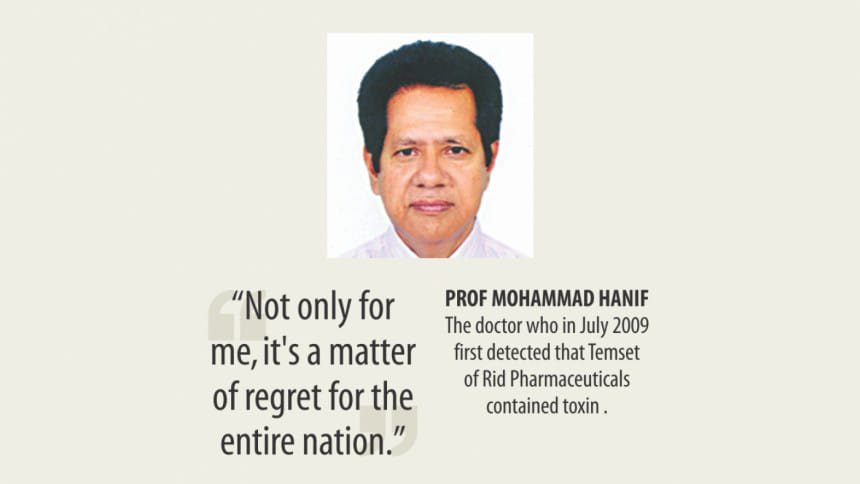Children's Death from Toxic Syrup: Case designed to be doomed

Negligence, inefficiency and incompetence of the Drug Administration in dealing with the case led to the acquittal of all the accused whose pharmaceutical company allegedly manufactured the toxic paracetamol syrup that killed at least 28 children in 2009.
Judge M Atoar Rahman of the Drug Court in Dhaka yesterday acquitted the five officials of Rid Pharmaceuticals Ltd, saying the prosecution utterly failed to prove the charge brought against the accused.
The accused are Rid's Managing Director Mizanur Rahman, directors Sheuli Rahman and Abdul Gani, and pharmacists Mahbubul Islam and Enamul Haque.
Sheuli is the wife of Mizanur. Both were in the dock when the judge pronounced the verdict, and the three others were on the run.
In an investigation in 2014, Bangladesh Law Commission found “manipulation” of the legal process and “sheer indifference” by the Directorate General of Drug Administration (DGDA) while dealing with four drug adulteration cases filed in the early 90s.
From June to August in 2009, 28 children across the country died of renal failures caused by the intake of the paracetamol syrup and suspension allegedly manufactured by Rid Pharma.
On July 22, 2009, the Drug Administration sealed off Rid's factory in BSCIC area of Brahmanbaria following wide media coverage of the children's death, and findings of Dhaka Shishu Hospital physician Prof Mohammad Hanif that Rid Pharma's Temset had toxic substance.
In August the same year, Shafiqul Islam, then superintendent of Drug Administration, filed the case with the Dhaka Drug Court and only five prosecution witnesses testified after the court indicted the five accused in March 2011.
Three other cases were also filed in this connection in Narayanganj, Brahmanbaria and Sylhet.
After yesterday's judgment, Prof Mohammad Hanif said: “Not only for me, it's a matter of regret for the entire nation.”
He said the judge mentioned about the negligence of the Drug Administration. So, he said, the drug administration and its officials who were involved in the case should be made accountable.
“They [drug administration officials] should answer why the accused did not get punishment when there is enough evidence and so many lives have been lost.”
The Daily Star tried to reach the director general and a director of the DGDA over the phone but failed.
Anwar Zahid Bhuiyan, a defence counsel, said he was happy as his clients were acquitted. But, at the same time, he is unhappy as the “real culprits” behind the death of the children remained unidentified.
“We hope the Drug Administration, in future, will file a case following due procedure and ensure punishment of the accused,” he told this newspaper last night.
FLAWS IN CASE
When charges were framed by the Dhaka court in March 2011, legal experts and the authorities concerned did not expect much, as they saw loopholes in the cases.
For example, autopsy was not done on any of the 28 children who died allegedly by taking the paracetamol laced with deadly diethylene glycol, an industrial solvent and an ingredient in antifreeze and brake fluid.
So there was hardly any chance of linking the deaths to the presence of the toxin.
Besides, the fact that diethylene glycol was present in Rid Pharma's paracetamol syrup, Temset, was not mentioned at all in three of the cases. Those cases only mentioned that the syrup was "substandard". The only exception was the case in Narayanganj.
Lacking was also noticed in testing the syrup. Products from the same batch were tested in government and private laboratories.
While the private tests showed presence of diethylene glycol, the government tests did not. No effort was made to check the validity of the government lab tests, and the private test results were not mentioned anywhere in the cases.
Prof Hanif, the man who blew the whistle first in 1992 confirming presence of diethylene glycol in four brands of paracetamol syrup, was again the first to announce presence of the same element in Temset around mid July in 2009.
Death of 20 children admitted to Dhaka Shishu Hospital with acute renal failure in June-July 2009 prompted Hanif to send to laboratory for testing a sample of Temset that he had collected from the family of a victim.
The test found toxin in the sample, Hanif told this newspaper in March 2011. The Daily Star was then conducting an investigation into the issue.
But while filing the case, the Drug Administration did not mention presence of diethylene glycol in Rid's drug; it rather mentioned the drug as “substandard”, Mahmud Hossain Jahangir, a public prosecutor in the case, told this newspaper yesterday.
Delivering the summary of the judgment yesterday, the judge said that from Prof Hanif, the Drug Administration collected the samples of paracetamol syrup and suspension manufactured by Rid Pharma.
But it neither made Hanif a witness nor produced him before the court to exhibit the seized materials.
The judge also said the Drug Administration did not seize any samples from Rid's factory where the said medicines were manufactured.
Besides, as per the law, the Drug Administration after collecting any sample was supposed to divide the seized materials into four parts.
One part was to be given to the accused, another to the court. It was to send another part to the laboratory while the drug administration would have to keep the fourth part, he added.
The Drug Administration did not follow the procedure, the judge mentioned.
Citing a 1987 High Court ruling, the judge said the HC overturned a lower court judgment as the verdict was delivered ignoring the mandatory provision of seizing any materials.
So, the activities of the Drug Administration showed negligence, inefficiency and incompetence in dealing with the case, the judge said before acquitting the accused.
Asked about the acquittal order, Public Prosecutor Mohammad Nadim Miah said he was dissatisfied over the verdict, adding that he would decide whether to file appeal after getting certified copy of the full verdict.
Asked why he did not produce Prof Hanif as a witness, Nadim said he took over as public prosecutor of the Drug Court in 2014. Recording of the testimony of the prosecution witnesses was completed by this time, he added.
NEGLIGENCE, NOT NEW
It took more than 22 years for the first trial in the drug adulteration cases to be completed mainly because of manipulation of the legal process and the drug regulatory body's sheer indifference, the Law Commission said in 2014.
On July 22, 2014, a Dhaka Court delivered verdict against the Adflame Pharmaceuticals, the country's first-ever judgment against drug adulterators. The case was filed in 1992.
The long delay in trial prompted the commission to launch an investigation.
Adflame is one of the five companies that allegedly used Di-Ethylene Glycol in their respective brands of paracetamol, prompting the DGDA to file cases against four of them in 1992. Three other companies are BCI (Bangladesh) Limited, Polychem Laboratories and Rex Pharma.
One of the companies was never sued as it had ties allegedly with the then BNP government, court sources said.
However, trial proceedings against all the four were stayed in 1994 following an HC order. After an investigative report by The Daily Star in November 2009 revealed “corruption” among government agencies to save the accused in the cases, trial of three companies resumed immediately.
But the trial in the BCI case could not be resumed until August 2011 as Abul Khair Chowdhury, a director of the DGDA and also complainant of the cases, disregarded the court orders to testify in the cases for another two years.
In August last year, the Dhaka Drug Court handed down three directors and three employees of the now-defunct BCI to 20 years of imprisonment and fined Tk 4 lakh each in two cases for producing and marketing toxic paracetamol syrup.
Appeals in the cases against Adflame and BCI are now pending with the High Court while trial proceeding of the case against Polychem Laboratories is now underway in the Drug Court.
The accused in the case against Rex Pharma, filed with a Mymensingh Drug Court, were acquitted, thanks to the prosecution's alleged reluctance to produce relevant documents before the court.

 For all latest news, follow The Daily Star's Google News channel.
For all latest news, follow The Daily Star's Google News channel. 



Comments